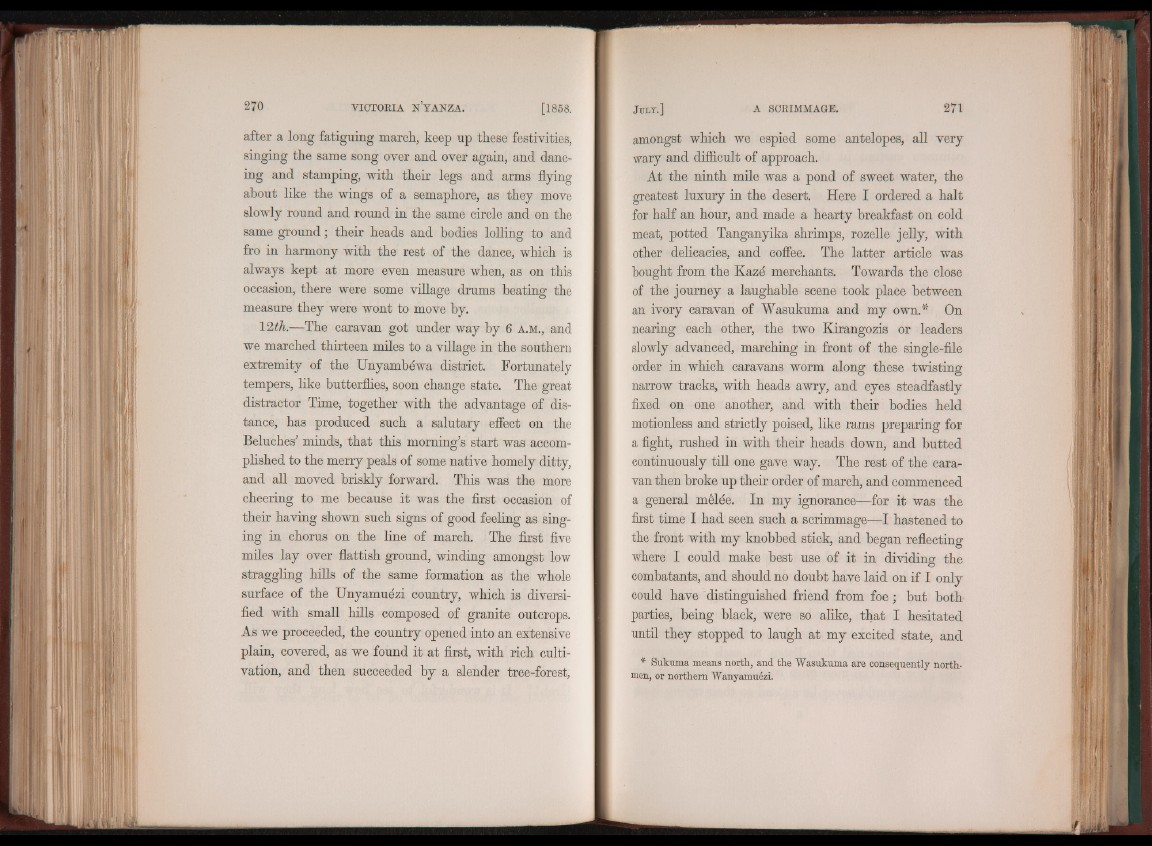
after a long fatiguing march, keep up these festivities,
singing the same song over and over again, and dancing
and stamping, with their legs and arms flying
about like the wings of a semaphore, as they move
slowly round and round in the same circle and on the
same ground; their heads and bodies lolling to and
fro in harmony with the rest of the dance, which is
always kept at more even measure when, as on this
occasion, there were some village drums beating the
measure they were wont to move by.
12th.—The caravan got under way by 6 A.M., and
we marched thirteen miles to a village in the southern
extremity of the Unyambewa district. Fortunately
tempers, like butterflies, soon change state. The great
distractor Time, together with the advantage of distance,
has produced such a salutary effect on the
Beluches’ minds, that this morning’s start was accomplished
to the merry peals of some native homely ditty,
and all moved briskly forward. This was the more
cheering to me because it was the first occasion of
their having shown such signs of good feeling as singing
in chorus on the line of march. The first five
miles lay over flattish ground, winding amongst low
straggling hills of the same formation as the whole
surface of the Unyamuezi country, which is diversified
with small hills composed of granite outcrops.
As we proceeded, the country opened into an extensive
plain, covered, as we found it at first, with rich cultivation,
and then succeeded by a slender tree-forest,
amo n g s t which we espied some antelopes, all very
wary and difficult of approach.
At the ninth mile was a pond of sweet water, the
greatest luxury in the desert. Here I ordered a halt
for half an hour, and made a hearty breakfast on cold
meat, potted Tanganyika shrimps, rozelle jelly, with
other delicacies, and coffee. The latter article was
bought from the Kazé merchants. Towards the close
of the journey a laughable scene took place between
an ivory caravan of Wasukuma and my own.* On
nearing each other, the two Kirangozis or leaders
slowly advanced, marching in front of the single-file
order in which caravans worm along these twisting
narrow tracks, with heads awry, and eyes steadfastly
fixed on one another, and with their bodies held
motionless and strictly poised, like rams preparing for
a fight, rushed in with their heads down, and butted
continuously till one gave way. The rest of the caravan
then broke up their order of march, and commenced
a general mêlée. In my ignorance—for it was the
first time I had seen such a scrimmage—I hastened to
the front with my knobbed stick, and began reflecting
where I could make best use of it in dividing the
combatants, and should no doubt have laid on if I only
could have distinguished friend from foe ; but both
parties, being black, were so alike, that I hesitated
until they stopped to laugh at my excited state, and
* Sukuma means north, and the Wasukuma are consequently north-
men, or northern Wanyamuézi.